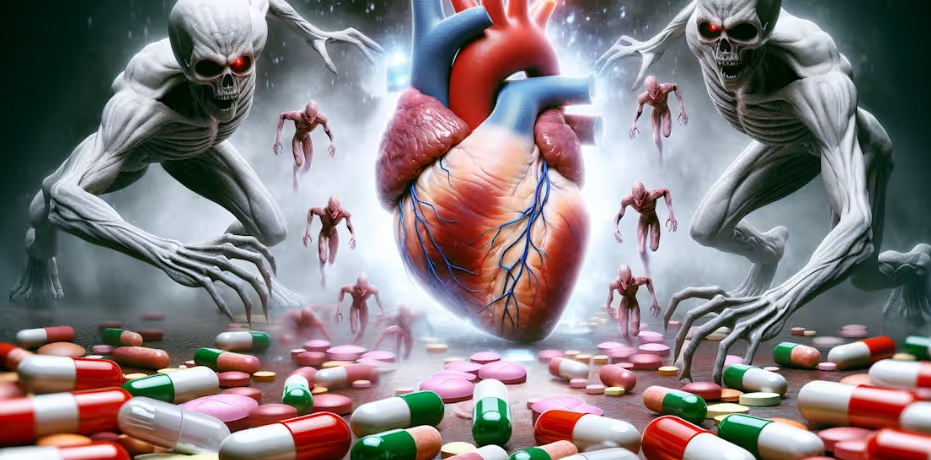Can Drugs Cause An Enlarged Heart?

Understanding Cardiomegaly
Cardiomegaly, or an enlarged heart, is a condition that warrants attention due to its potential to severely impact heart health. This condition may be caused by a variety of factors, including certain drug use.

Definition and Causes of Cardiomegaly
Cardiomegaly is a medical condition characterized by an abnormally large, weak heart that is unable to pump blood efficiently. This condition can significantly increase the risk of heart failure and sudden cardiac death. Substance abuse can lead to cardiomegaly, with drugs like cocaine, methamphetamines, and alcohol being implicated in its development.
The misuse of stimulant drugs like cocaine and methamphetamines can cause the heart to beat too quickly, leading to irregular heart rhythms, high blood pressure, inflammation of the heart muscle, and cardiomyopathy - all of which can contribute to an enlarged heart. Chronic heavy drinking can result in alcoholic cardiomyopathy, where the heart muscle weakens and enlarges due to the toxic effects of alcohol leading to inefficient pumping of blood and possibly resulting in heart failure.
In addition to direct effects on the heart, substance abuse can also contribute to an enlarged heart by causing high blood pressure, increasing the risk of blood clots, and promoting atherosclerosis - all factors that can strain the heart and lead to cardiac enlargement.
Symptoms and Diagnosis of Cardiomegaly
Symptoms of cardiomegaly can vary depending on the severity of the condition. Some individuals may not exhibit any symptoms, while others may experience shortness of breath, fatigue, irregular heartbeat, swelling of the legs and feet, and other signs of heart failure.
If cardiomegaly is suspected, a healthcare provider may use a variety of diagnostic tools to confirm the diagnosis. These might include a physical examination, medical history review, and specific tests such as a chest X-ray, electrocardiogram (ECG), echocardiogram, or MRI of the heart.
The diagnosis of cardiomegaly is a serious matter, requiring immediate medical attention and intervention. If left untreated, it can lead to life-threatening complications such as heart failure, arrhythmia, or even sudden cardiac death. Therefore, it is crucial to recognize and address the potential role of substance abuse in causing or exacerbating this condition.
Impact of Substance Abuse on Heart Health
Substance abuse, particularly the misuse of drugs like cocaine, methamphetamines, alcohol, and anabolic steroids, can lead to detrimental effects on heart health. These substances can contribute to the development of cardiomegaly, a condition characterized by an abnormally large and weak heart that struggles to pump blood efficiently. This condition significantly increases the risk of heart failure and sudden cardiac death.
Cocaine and Amphetamines
The use of stimulant drugs like cocaine and amphetamines has a direct impact on heart health, often leading to cardiomegaly. These substances can cause the heart to beat too quickly, leading to irregular heart rhythms, high blood pressure, inflammation of the heart muscle, and cardiomyopathy - all of which can contribute to an enlarged heart.
In addition to the direct effects on the heart, the misuse of these substances can also contribute to the enlargement of the heart by causing high blood pressure, increasing the risk of blood clots, and promoting atherosclerosis - all factors that can strain the heart and lead to cardiac enlargement.
Alcohol and Tobacco
Chronic heavy drinking can result in alcoholic cardiomyopathy, a condition where the heart muscle weakens and enlarges due to the toxic effects of alcohol. This condition leads to the inefficient pumping of blood and can result in heart failure [1].
Tobacco use, while not directly leading to cardiomegaly, contributes to heart disease and cardiovascular complications like high blood pressure and atherosclerosis. These conditions can strain the heart, potentially leading to enlargement over time.
Anabolic Steroids
Anabolic steroids, often misused for performance enhancement, can also contribute to heart enlargement. These substances increase muscle mass, including the heart muscle, leading to potential enlargement and reduced efficiency in blood pumping. Further research is needed in this area, but it is clear that misuse of these substances can have serious implications for heart health.
Drug-Induced Heart Enlargement
Substance abuse can significantly impact heart health, leading to conditions such as cardiomegaly or an enlarged heart. This section will explore the roles of stimulant drugs, anabolic steroids, and alcohol in causing heart enlargement.
Role of Stimulant Drugs
The misuse of stimulant drugs like cocaine and methamphetamines can cause the heart to beat too quickly, leading to irregular heart rhythms, high blood pressure, inflammation of the heart muscle, and cardiomegaly. All these conditions can contribute to an enlarged heart [1].
Stimulants like cocaine or methamphetamine cause a sudden spike in heart rate and blood pressure, leading to strain on the heart muscle and potentially causing an enlarged heart.
In addition to direct effects on the heart, substance abuse can also contribute to enlarged heart by causing high blood pressure, increasing the risk of blood clots, and promoting atherosclerosis - all factors that can strain the heart and lead to cardiac enlargement [1].
Role of Anabolic Steroids
Anabolic steroids, often misused by athletes and bodybuilders, can also contribute to heart enlargement. They disrupt the hormonal balance in the body and cause abnormal increase in muscle mass, including the heart. This condition is known as drug-induced heart hypertrophy [3].
Furthermore, illegal drug abuse can have serious health consequences, increasing the risk of heart attack, stroke, and heart failure. Using illegal drugs like cocaine, amphetamines, or anabolic steroids can result in an enlarged heart, irregular heart rhythms, and heart valve infections.
Role of Alcohol
Chronic heavy drinking can result in alcoholic cardiomyopathy, where the heart muscle weakens and enlarges due to the toxic effects of alcohol. This condition leads to the inefficient pumping of blood and can result in heart failure.
Excessive alcohol consumption over a prolonged period can have detrimental effects on the heart, potentially leading to heart enlargement. Alcohol-induced heart enlargement occurs when the heart muscles become weakened and enlarged due to the toxic effects of alcohol.
Certain drugs can trigger cardiotoxicity, leading to inflammation and damage to the heart muscle cells. This damage can result in myocarditis or heart failure, which may present as an enlarged heart condition [2].
Drug-induced heart enlargement is a serious condition that requires immediate medical attention. It's crucial to understand the roles of different substances in causing this condition to prevent it and ensure heart health.
Effects of Prescription Drugs on Heart Health
While most people are aware of the dangers posed by illicit drugs, the potential effects of prescription drugs on heart health are less commonly discussed. However, certain medications, including chemotherapy drugs, antipsychotics, and non-steroidal anti-inflammatory drugs (NSAIDs), can contribute to cardiomegaly, or an enlarged heart. Consequently, it's important to consider these potential side effects when evaluating the overall health impact of these drugs.
Chemotherapy Drugs and Cardiomegaly
Chemotherapy drugs are a crucial component in the fight against cancer. However, they can have significant side effects, including heart damage that leads to an enlarged heart. This can occur during treatment or even years after treatment has ended. Certain chemotherapy drugs used to treat breast cancer and other types of cancer are particularly known for this.
The condition, known as drug-induced dilated cardiomyopathy (DCM), results in the heart becoming enlarged and less effective at pumping blood. While this is a serious condition, it's important to remember that not everyone who undergoes chemotherapy will experience these effects. Regular monitoring and early detection can help manage potential heart complications.
Antipsychotics and Heart Health
Antipsychotic medications, primarily used to manage mental health conditions, can also contribute to an enlarged heart. These drugs have been linked to drug-induced heart failure, which can lead to the heart enlarging over time.
Like chemotherapy drugs, not everyone who takes antipsychotic medications will experience these side effects. However, it's crucial for those taking these medications to monitor their heart health regularly. This includes regular check-ups with healthcare providers and lifestyle changes to promote overall heart health.
Non-Steroidal Anti-Inflammatory Drugs (NSAIDs)
Non-steroidal anti-inflammatory drugs (NSAIDs), commonly used to manage pain and inflammation, have also been associated with heart health risks. Prolonged use of NSAIDs can contribute to drug-induced heart failure, leading to an enlarged heart [5].
While NSAIDs are generally safe for short-term use, long-term use or use in high doses can increase the risk of heart health issues. As with other medications, it's important for those taking NSAIDs to do so under the supervision of a healthcare provider and to monitor their heart health.
It's worth noting that while many prescription drugs can potentially contribute to an enlarged heart, the benefits of these medications often outweigh the risks. Regular monitoring, early detection, and management of side effects can help mitigate these risks. The key is to be aware of these potential effects and to be proactive in maintaining heart health. Always consult with a healthcare provider when starting any new medication regimen.
Managing Drug-Induced Heart Enlargement
The potential of certain substances and medications to induce heart failure, leading to an enlarged heart, underscores the necessity of careful management and supervision. This section outlines the importance of medical supervision, the role of early diagnosis and treatment, and lifestyle changes that can enhance heart health.
Importance of Medical Supervision
Consultation with healthcare professionals is critical before starting or stopping any medication that could potentially affect heart health. Certain medications, including chemotherapeutic agents, some antipsychotic drugs, and non-steroidal anti-inflammatory drugs (NSAIDs), have been linked to drug-induced heart failure, which can contribute to the enlargement of the heart [5].
Medical supervision helps ensure that the benefits of a medication outweigh its potential risks. It also provides an opportunity for healthcare professionals to monitor the patient's heart health regularly and make necessary adjustments to their treatment plan if adverse effects occur.
Early Diagnosis and Treatment
An enlarged heart, also known as cardiomegaly, can result from various factors, including drug-induced heart failure. Symptoms of an enlarged heart may include fatigue, swelling, and shortness of breath [5]. Recognizing these symptoms early and seeking immediate medical attention can facilitate a timely diagnosis and appropriate treatment.
Early treatment can help manage the symptoms, slow the progression of the condition, and potentially prevent serious complications such as heart failure or stroke. Treatment options may include changes in medication, lifestyle modifications, and in severe cases, surgical procedures.
Lifestyle Changes for Heart Health
Lifestyle changes can significantly improve heart health and help manage conditions such as drug-induced heart enlargement. These changes may include maintaining a healthy diet, regular exercise, quitting smoking, and limiting alcohol consumption.
Alcohol and illicit drugs are known to potentially cause an enlarged heart by weakening the heart muscle and leading to heart failure. Combining substances like alcohol and drugs can exacerbate the risk of heart damage.
Regular check-ups with healthcare professionals can also help monitor the effectiveness of these lifestyle changes and provide guidance on further ways to improve heart health. Through a combination of medical supervision, early diagnosis and treatment, and lifestyle modifications, the risks associated with drug-induced heart enlargement can be effectively managed.
References
[1]: https://americanaddictioncenters.org/health-complications-addiction/substance-abuse-heart-disease
[2]: https://www.heart.org/en/health-topics/consumer-healthcare/what-is-cardiovascular-disease/illegal-drugs-and-heart-disease
[3]: https://www.townsendla.com/blog/drugs-cause-enlarged-heart
[4]: https://www.medicalnewstoday.com/articles/signs-of-heart-damage-from-drugs-2
[5]: https://www.medicalnewstoday.com/articles/drug-induced-heart-failure
You’re not alone in this.
When mental health challenges and addiction intersect, it can feel isolating. At Arista, we offer compassionate, evidence-based, and trauma-informed care to help you heal, grow, and move forward.
You’re not alone in this.
When mental health challenges and addiction intersect, it can feel isolating. At Arista, we offer compassionate, evidence-based, and trauma-informed care to help you heal, grow, and move forward.
Support that moves with you.
You’ve taken a brave first step. At Arista Recovery, we’re here to help you continue with best-in-class care designed for long-term healing and support.
.webp)






